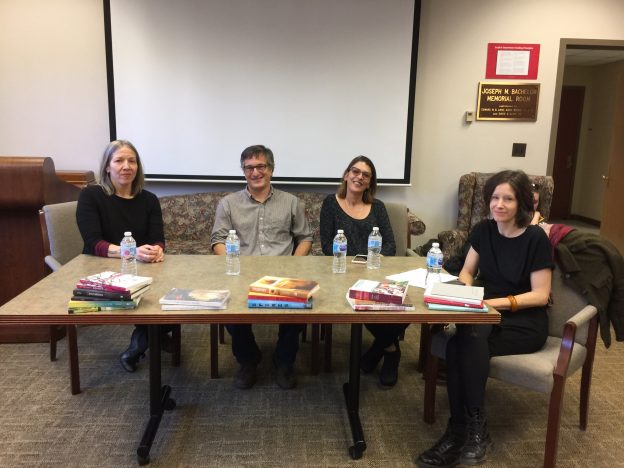At the Miami University Creative Writing Program’s first annual Publishing Symposium on Friday, April 20th, literary agent Ayesha Pande and magazine publishers Rebecca Wolff and Michael Griffith gave a roomful of students advice on making their mark in the ever-shifting publishing landscape.
In their initial address, Pande, Wolff, and Griffith discussed the challenges of getting published and encouraged the audience to begin sending out their work. Pande advised students to find their identities as writers and create “a package of writing” to showcase their unique styles. She recommended sending out short fiction “religiously and relentlessly,” continuing to build a short fiction portfolio until they can no longer progress as short fiction writers, at which point she recommended seeking out an agent for novels.
Griffith added a corollary, advising fledgling writers tosubmit their work only when they felt it was ready. He warned that writers are “only going to get one chance at the apple” with each magazine, and that most literary magazines would not accept previously submitted work even if the author revised it. He also encouraged audience members not to worry about their lack of writing credentials when submitting to literary magazines.
“Editors love working with writers who have not been published before,” he said. Wolff followed up by advising that writers should read literary magazines both in print and online, saying that online journals often publish only shorter works.
The panelists later cautioned the audience about self-publishing. While Wolff acknowledged that the “stigmas” attached to self-publishing have mostly “washed away,” she said traditional publishers still offer enough benefits to writers, remaining the superior option.
Pande added that self-publishing requires writers to “be [their] own publisher,” taking on all the elements of editing, book design and marketing that publishing houses traditionally handle. She also warned that “bookstores will not take self-published books,” so self-published authors will be limited to online stores and e-book distributors.
Griffith said that “if you self-publish in a way that engages a lot of people,” with a community of friends helping with publishing tasks, then self-publishing can be worth it. Otherwise, he only recommended self-publishing “if you are in a hurry.”
In addition to talking about getting published, the panelists discussed working in the publishing industry. All three acknowledged the difficulty of breaking into the field, warning that a number of internships are required to break into one of the traditional “Big 5” publishing houses—Hachette, HarperCollins, Macmillan, Penguin Random House, and Simon & Schuster—and that as these publishing houses are all in New York City, finding a job in publishing is expensive. On the other hand, Griffith recommended working for literary magazines, saying that he “never learned more about writing than in my first three months at Southern Review,” and that most non-university-run magazines require only a time commitment and volunteering in order to join the reading staff.
Wolff echoed Griffith’s encouragements, saying that the literary magazine world changed with the rise of the internet, and that reading remotely for literary magazines is now a valid option for people who want to work in the literary world.
A student asked whether good editors also need to be good writers. All the panelists said no. Wolff said that it “used to be really common” that writers and editors were driven by “distinct impulses,” and that she was surprised to hear the question. Pande similarly said that writing and editing are “two distinct crafts.”
In addition to the panel, the three guests met with second-year students of Miami’s MFA program to discuss the student’s work. According to Dr. Cathy Wagner, director of the Creative Writing Program, next year’s Publishing Symposium guests will work with both first and second-year MFA students.
Pande has worked for more than 20 years in the publishing industry. In addition to launching the Ayesha Pande Literary Agency, she has held editorial positions at HarperCollins, Crown Publishers, and Farrar, Straus & Giroux. Her clients include National Book Award, PEN/Bingham Prize and PEN/Bellwether Prize winners, alongside a PEN/Hemingway finalist and a NYT Bestseller.
Rebecca Wolff is the founder and co-editor of Fence Magazine, as well a member of the board of directors for Fence Books. Her books of poetry have won the National Poetry Series and the Barnard New Women Poets Prize.
Michael Griffith is the founding editor of LSU Press’ Yellow Shoe Fiction, and is the fiction editor at The Cincinnati Review. He served as the associate editor of The Southern Review from 1992 to 2002, and is currently a Professor of English at the University of Cincinnati. His most recent novel, Trophy, was named as one of Kirkus’ “Best 25 Books of Fiction” in 2011. He has received fellowships from the National Endowment for the Arts and the Louisiana Division of the Arts.
Evan Doran
English Department Ambassador


